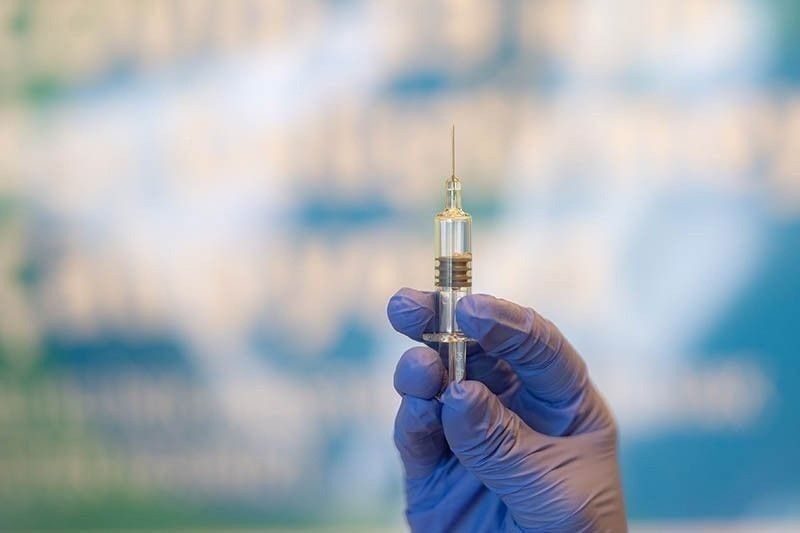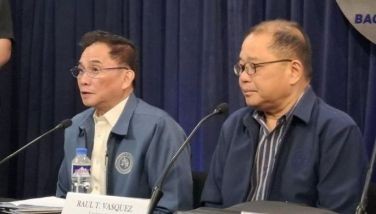Government to spend P73.2 billion for vaccines

MANILA, Philippines — The government is planning to spend P73.2 billion to buy vaccines for 60 million Filipinos as it tries to revive the economy while containing the COVID-19 pandemic.
Finance Secretary Carlos Dominguez III said the administration would borrow P40 billion from multilateral agencies World Bank and Asian Development Bank, while P20 billion would come from domestic sources like Land Bank of the Philippines, Development Bank of the Philippines and government-owned and controlled corporations. About P13.2 billion will be borrowed from bilateral sources.
“So the total is about P73.2 billion of financing... It’s almost fixed. Most of it is already fixed, although P13.2 billion is not yet completely negotiated,” Dominguez said during a meeting of the government’s pandemic task force in Davao City last Monday.
Health Secretary Francisco Duque III said immunizing 60 million Filipinos is enough to achieve herd immunity, a concept in which a population can be protected from a certain virus if a threshold of vaccination is reached.
Dominguez said the average cost of the COVID-19 vaccine is $25 or about P1,200 per person. He noted that vaccine prices vary, but the government has sources to buy them.
“Basically 60 million is OK and we have the funds for that,” he said.
COVID-19 national policy chief implementer Carlito Galvez Jr. said the Philippines is negotiating with four companies for the purchase of COVID-19 vaccines, namely, Sinovac, Pfizer, Johnson & Johnson and AstraZeneca.
Galvez, who is also vaccine czar, disclosed an advanced commitment with AstraZeneca might be completed by this month. He added that AstraZeneca offers the lowest price at about $5 per dose.
“We already have negotiations and the quota they provided is huge, 20 million doses,” he said.
Under the best-case scenario, the vaccine will reach the Philippines in the second quarter of 2021, according to Galvez.
President Duterte assured the public that the purchase of vaccines would be transparent.
Duterte had earlier approved the advance prepayment for COVID-19 vaccines, especially now that countries are racing to get access to these vaccines.
The Philippines’ total number of confirmed COVID-19 cases hit 421,722 yesterday.
‘Gov’t need not borrow money’
The government need not borrow money to buy COVID-19 vaccines, but simply retrieve the estimated P34 billion being illegally held by a trading company of the Department of Trade and Industry (DTI) to fund the purchase, Senate Minority Leader Franklin Drilon said yesterday.
In his privilege speech denouncing the dismal failure of the Philippine International Trading Corporation (PITC) to fulfill its duty of making urgent purchases for frontline agencies, Drilon explained that the PITC was apparently also being used as a “pawn” by some government offices to cover up possible procurement irregularities.
“We need funds to finance procurement of vaccines; to address our 6.5 million housing backlogs; to feed 5.5 million of hungry Filipinos; to support the 4.6 million unemployed Filipinos,” he said.
“Let’s not borrow anymore. The PITC should just return the P33.4 billion,” he said.
The PITC is reportedly being eyed to purchase COVID-19 vaccines worth P20 billion that senators warned would be a disastrous move for Filipinos waiting to be inoculated.
Drilon said the Governance Commission for GOCCs gave the PITC a grade of 76 percent in 2018 for failing to achieve the minimum acceptable accomplishment in the areas of social impact, financials and internal processes.
Among the purchases that the agency failed to make several years back, according to the senator, were firetrucks for the Bureau of Fire Protection and relief packs for disaster victims ordered by the Office of Civil Defense worth billions of pesos.
Worse, he said, the PITC has not returned the unused funds to the concerned agencies, including the Departments of Social Welfare and Development, and Health, but made profit from them by investing the same in the money market.
Drilon, however, said the PITC apparently is also being used by other agencies to make it appear that they have been disbursing their budgets allocated by Congress so the funds will not expire and be returned to the National Treasury.
Tri-party deal
Tycoon Enrique Razon Jr.’s International Container Terminal Services Inc. (ICTSI) is set to purchase COVID-19 vaccines from pharmaceutical giant AstraZeneca, half of which will be given to the government.
ICTSI executive vice president Christian Gonzalez yesterday disclosed that the purchase of the vaccines is made possible through an initiative of AstraZeneca, the United Kingdom government and the Philippine government.
“Under this, which will be a tri-party agreement, what will happen is the private sector will shoulder the cost, not only of the 50-percent deposit for the AstraZeneca vaccine, but likewise the remaining 50 percent due once the vaccine is delivered which is expected now sometime in the second quarter of 2021,” Gonzalez said.
He added that half of the vaccine it would purchase would be solely for the use of the Department of Health (DOH) through an equitable distribution to be determined by the government, while the other 50 percent is for the private entity to determine.
ICTSI’s 50-percent share of the vaccine is eyed for use by essential logistics providers as well as employees of the company and the entire Razon Group, according to Gonzalez.
“Naturally, one of the targets we will have will be our own employees, but in the case of ICTSI, we strongly believe that some of the key essential services members that really made the biggest impact, especially at the beginning of the pandemic, were the employees of the Philippine Ports Authority, Bureau of Customs and other essential frontline port and logistics workers,” he said.
“The allocation of the Philippines is approximately three to five million doses and we already have commitments as of today for up to two million doses to be funded by the private sector. Those two million doses will cover one million people, the vast majority of whom will be government employees, frontline health workers and other essential services workers as designated by the DOH and, of course, some of the other essential services workers like those in logistics as I have mentioned,” he added.
ICTSI is a publicly listed firm which is in the business of port development, management and operations. It operates 31 terminals in 19 countries. – Alexis Romero, Paolo Romero, Richmond Mercurio
- Latest
- Trending

































